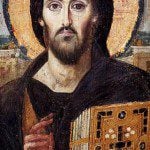
A NASA/JPL-Caltech public domain artist’s visualization of an exoplanetary “water world”
The Interpreter Foundation continues to post interesting material for you, even in this rather challenging time of “social distancing.” For instance, this item went up earlier today:
Part of our book chapter reprint series, this article originally appeared in In God’s Image and Likeness 2: Enoch, Noah, and the Tower of Babel (2014) by Jeffrey M. Bradshaw and David J. Larsen.
Abstract: This chapter reviews the career of Noah as the Flood hero and as the angel Gabriel. The ideal, orderly family of Noah offers a sharp contrast to the wickedness and chaos in the world that Noah unsuccessfully calls to repentance. The enigmatic description of the “sons of God” and the “sons of men” in Genesis 6:1-4 are clarified in the Book of Moses. Resemblances between the Ark and the Tabernacle are highlighted.
***
I’ve begun looking again at Michael Rota, Taking Pascal’s Wager: Faith, Evidence and the Abundant Life (Downers Grove, IL: InterVarsity Press, 2016).
First he introduces Blaise Pascal (1623-1662), who (obviously) figures in the title of his book:
Pascal made important contributions in mathematics, probability theory and physics. His work on fluid mechanics was instrumental in the later invention of the hydraulic press, and he himself designed and built one of the first mechanical calculating machines, an early precursor to the digital computer. (Interestingly, the principles used in the machine are still employed in many automobile odometers.) Pascal was an inventor, an intellectual and a scientist. He was also a deeply religious man. At the age of thirty-one he had a powerful mystical experience of God. He described the experience in a note and stitched the note into his coat, keeping it close to him. He evidently transferred the paper note (together with a cleaner copy he put down on parchment) from coat to coat for the rest of his life — a servant found them after his death. (22-23)
Here is an interpretive summary by Dr. Rota — not his only reformulation of it — of the famous “wager” that appears in Pascal’s classic Pensées or “Thoughts”:
If Christianity is indeed true, then by committing to live a Christian life one brings great joy to God and all others in heaven, raises the chance that one will be with God forever, raises the chance that one will help others attain union with God, expresses gratitude to God, and becomes more aware of God’s love and more receptive to his help in the course of one’s earthly life. On the other hand, if Christianity is false, the person who commits his or her life to Jesus’ teachings has still lived a worthwhile life, striving for moral excellence and experiencing the benefits of religious community (benefits that contemporary sociological research reveals to be significant). (23)












